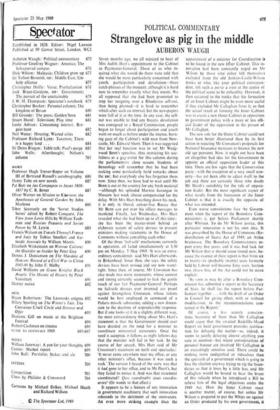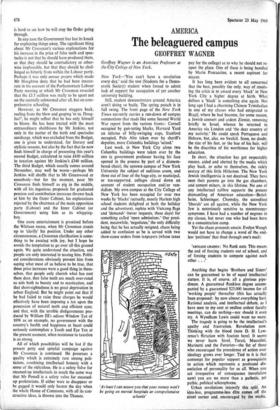Strangelove as pig in the middle
POLITICAL COMMENTARY AUBERON WAUGH
Seven months ago, we all rejoiced to hear of Mrs Judith Hart's appointment to the Cabinet as Paymaster-General. Those of us who in- quired what she would do there were told that she would be most particularly concerned with youth, participation and devolution—three catch-phrases of the moment, although it is hard now to remember exactly what they meant. We all supposed that she had been promoted to stop her resigning over a Rhodesian sell-out, then being planned—it is hard to remember which after such an interval, but the newspapers were full of it at the time. In any case, the sell- out was unable to find any buyers. devolution was consigned to a Royal Commission, people began to forget about participation and youth went on much as before under the intense, burn- ing gaze of the Cabinet's wild man from New- castle, Mr. Edward Short. Then it was suggested that her real function was to vet Mr Wedg- wood Benn's speeches, thus restricting his use- fulness as a gag-writer for this column during the parliamentary close season. Students of Bennology will remember that he had been making some particularly lurid remarks about the sac, but everybody else has forgotten them now. Since then, we have had to wait until Mr Benn is out of the country for any fresh material —although his splendid Marxist harangue in Moscow last week almost compensated for the delay. With Mrs Hart breathing down his neck, it is only in liberal, censor-free Russia that Mr Benn can put over his silliest messages to mankind. Finally, last Wednesday, Mrs Hart revealed what she had been up to all this time: she has been the master-mind behind an elaborate system of safety devices to prevent ministers making statements in the House of Commons without consulting each other.
Of the three 'fail-safe' mechanisms currently in operation, all failed simultaneously at 3.30 pm on Monday, 5 May 1969. 'It was an extra- ordinary coincidence, said Mrs Hart afterwards, in Birkenhead. Since then, she says, the safety devices have been revised and are now water- tight. Since then, of course, Mr Crossman has also made two more statements, whose context and timing certainly seemed to lack the gentle touch of our fair Paymaster-General. Perhaps no fail-safe devices ever invented are proof against Strangelove Crossman, whose talents would be best employed in command of a Polaris missile submarine, adding a new dimen- sion to the doctrine of unpredictable response.
But if one looks at it in a slightly different way, the most extraordinary thing about Mrs Hart's statement is that the Government should ever have decided on the need for a minister to coordinate ministerial statements. Once the need is accepted, it follows as night follows day that the minister will fail in her task. In the course of her speech, Mrs Hart said of Mr Crossman's statement on teeth and spectacles:
`It never came anywhere near my office, or any other minister's office, because it was such a rush.' The version I heard of the story was that it had gone to her office, and to Mr Peart's, but they failed to notice it. And was that statement coordinated? Quis coordinabit ipsas coordin- antes? (Or words to that effect.)
It appears to be a feature of any innovation in government machinery that such innovation rebounds to the detriment of the innovators. An even more striking example than the appointment of a minister for Coordination is to be found in the new liner Cabinet. This in- novation had been constantly urged on Mr Wilson by those who either felt themselves excluded from the old Jenkins-Castle-Wilson troika or who, like your political correspon- dent, felt such a pantie a trois at the centre of the political scene to be unhealthy. However, it then occurred to the troika that the formation of an Inner Cabinet might be even more useful if they excluded Mr Callaghan from it, so that the actual result of forming the Inner Cabinet was to create a new Outer Cabinet in opposition to government policy with a more or less offi- cial leader of the opposition in the person of Mr Callaghan.
The new role for the Outer Cabinet could not. have been better illustrated than by its first action in rejecting Mr Crossman's proposals for National Insurance increases to finance the new old age pensions. Now, it might not have been an altogether bad idea for the Government to appoint an official opposition leader at this time. There are few signs that the Conservative party—with the exception of a very small min- ority—has yet been able to adjust itself to the job and there are certainly those who doubt Mr Heath's suitability for the role of opposi- tion leader. But the most significant aspect of what results from the formation of the Inner Cabinet is that it is exactly the opposite of what was intended.
Even worse convolutions face *he Govern- ment when the report of the Boundary Com- missioners is put before Parliament shortly after Whitsun. To do Mr Wilson justice, this particular innovation is not his own idea. It was prescribed by the House of Commons (Re- distribution of Seats) Act of 1949, an Attlee brainwave. The Boundary Commissioners re- port every five years, and it was bad luck for Mr Wilson that it should come round now, be- cause the essence of their report is that from six to twenty-six (probably twenty) seats formerly held by Labour will become Tory seats. Section two, clause live, of the Act could not be more explicit:
`As soon as may be after a Boundary Com- mission has submitted a report to the Secretary of State, he shall lay the report before Par- liament together ... with the draft of an Order in Council for giving effect, with or without modification, to the recommendations con- tained in the Report.'
Of course, a less acutely conscien- tious Secretary of State than Mr Callaghan could argue that the awaited Redcliffe-Maud Report on local government provides justifica- tion for delaying the matter—as, indeed, it seems to justify delaying almost anything you care to mention—but where considerations of personal honour are involved Mr Callaghan is an exceedingly sensitive soul. There could be nothing more undignified or ridiculous than the spectacle of a government which is going to lose the election anyway trying to rig the boun- daries so that it loses by a little less, and Mr Callaghan would be bound to bear the brunt of this ridicule when he introduced a Bill to relieve him of the legal objections under the 1949 Act. How the Inner Cabinet react is another matter, of course, but unless Mr Wilson is prepared to put the Whips on against an Order produced by his own government, it
is hard to see how he will stop the Order going through.
In any case the Government has lost its knack for explaining things away. The significant thing about Mr Crossman's various explanations for his increase in the price of false teeth and spec- tacles is not that he should have produced them, or that they should be contradictory or other- wise implausible, but that they should be chal- lenged so bitterly from within the Labour party.
Perhaps it was only amour propre which made Mr Houghton deny that he had been inaccu- rate in his account of the Parliamentary Labour Party meeting at which Mr Crossman revealed that the £3.5 million was really to be spent not on the mentally subnormal after all, but on com- prehensive schooling.
However, as Mr Crossman staggers back, reeling from the blow and gasping 'et tu, Doug- las?', he might reflect that he has only himself to blame. He has been treated with the most extraordinary shabbiness by Mr Jenkins, not only in the matter of the teeth and spectacles surcharge, which was excluded from the Budget, one is given to understand, for literary and stylistic reasons, but also by the fact that he now finds himself in charge of presenting this year's second Budget, calculated to raise £430 million in taxation against Mr Jenkins's £340 million.
The third Budget, which usually comes around November, may well be worse—perhaps Mr Jenkins will shuffle that to Mr Greenwood or somebody—but for the moment, poor Mr Crossman finds himself as pig in the middle, with all his ingenious proposals for graduated pension and contribution increases thrown back at him by the Outer Cabinet, his explanations rejected by the chairman of the main opposition party (Labour) and the Inner Cabinet (or Government) using him as its whipping- boy.
One more entertainment is promised before the Whitsun recess, when Mr Crossman stands up to 'clarify' his position. Under any other circumstances, a Crossman clarification is some- thing to be awaited with joy, but I hope he avoids the temptation to go over all this ground again. We quite understand the situation, and people are only interested in teasing him. Politi- cal considerations obviously prevent him from saying what most of us believe to be true, that these price increases were a good thing in them- selves, that people only cherish what has cost them dear, that false teeth are much over-rated as aids both to beauty and to mastication, and that short-sightedness is no great deprivation in urban England. But he might point out that if he had failed to raise these charges he would effectively have been imposing a tax upon the possession of natural teeth and efficient eyes; and that, with the terrible disfigurements pro- duced by William III's odious Window Tax of 1696 as an example, no government with the country's health and happiness at heart could seriously contemplate a Tooth and Eye Tax at the present moment, when resistance to taxation is so strong.
All of which possibilities will be lost if the present petty and spiteful campaign against Mr Crossman is continued. He possesses a quality which is extremely rare among poli- ticians, combining intellectual honesty with a sense of the ridiculous. He is a safety halve for steamed-up intellectuals in much the same way that Mr Powell is a safety valve for steamed- up proletarians. If either were to disappear or be gagged it would only hasten the day when the whole House of Commons, with all its con- structive ideas, is thrown into the Thames.







































 Previous page
Previous page